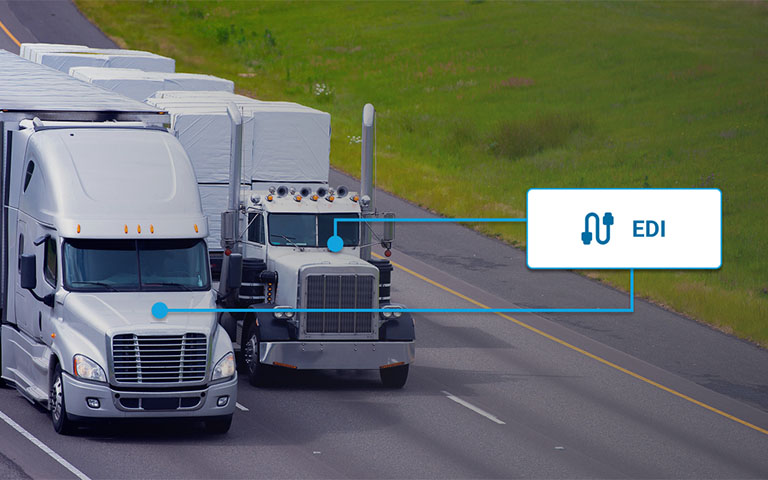What is happening with autonomous trucking?

The development of autonomous trucking has brought a lot of tech companies into the transportation bubble. It has also raised the ears of carriers concerned about job security in the coming years.
Because Shipwell provides both a software platform and a full-suite 3PL, autonomous trucking affects us in several ways. Here are some thoughts we have about upcoming technology shifts in the industry, and how to better understand the impacts.
Developing complementary tech
First of all, transportation technology is developing faster than federal regulation is able to pass and approve legislation. However, big changes we've been hearing about will not happen overnight. This scale of tech has got to roll out in smaller phases.
In fact, drivers are not cut out of the mix. Beyond simply steering the truck, drivers fix mechanical problems, check brakes and air hoses, provide necessary communication to shippers and brokers, and plenty of other valuable tasks. Something that autonomous technology doesn't have just yet is the intuition to imitate the instincts of human drivers. While yes, there are sensors available to stop crashes from happening, there's no way to know something that will happen two seconds in the future.
Step-by-step innovations
The first innovation that will likely roll out in the next three to five years is the fuel-saving method of "platooning".
Essentially, one driver will man a truck with two close-trailing autonomous trucks connected by wireless communication. This method allows for safer highway traffic while cutting down on dangerous emissions.
Another small innovation that will let truckers work closer to home is the implementation of "truck ports". Autonomous trucks run the long over-the-road highway miles and drivers will take over at a terminal to drive the last few local miles. This would change our relationship with the dreaded "rush hour."
Disrupting the supply chain
As shipping evolves, the supply chain will be disrupted. Algorithms will allow trucks to be fuller, and latent capacity will be priced cheaper. Some predict that new 3PL and warehousing models will emerge, drastically altering how the industry conducts business today.
Jason Traff, Co-founder and President of Shipwell, talks about this on the Dynamo VC podcast. "3PLs' roles will shift to become more consultative. They will look at inefficiency in how products are distributed or in operations or at warehouses or docks."
Even with advances in freight tech, the human elements of customer service and supply chain optimization will emerge as essential roles for those working in logistics.
Fortunately, that's already happening today at Shipwell. We're coupling smart, automated freight tech with managed services to ensure freight is delivered as efficiently as possible.
On the road today
So what is happening in the field today? Currently, there are a handful of companies creating a stir by prototyping and releasing footage of their smart trucks online. Daimler, Waymo, Tesla, Embark, and TuSimple are all companies taking strides in the research and development of autonomous trucking.
TechCrunch reports that Nuro, an autonomous delivery startup, has a small vehicle that can deliver up to twelve grocery bags. Recently, Domino's has started testing driverless delivery, which has the internet buzzing with excitement.
However, companies like TuSimple just hit unicorn status in it's Series D funding. They have a self-driving truck running 3 to 5 autonomous routes a day in Arizona. The trucks employ two safety engineers, one at the wheel and one analyzing data. Soon, TuSimple will move into Texas for more commercial deliveries.
How far out are we?
In brief, the race for the first company to produce a driverless, autonomous truck and have it on the market is close to starting, but the gun hasn't gone off just yet. At any rate, the full realization of autonomous trucking is a long way away.
"Despite the vast sums of money and time dedicated to developing and rolling out autonomous vehicles, there are no real autonomous vehicles today," FreightWaves stated in a recent article.
What shippers, carriers, and 3PLs can focus on today are methods to simplify manual processes of booking, tracking, and reporting on freight logistics.
One major hassle for everyone involved in freight are check calls to drivers to track shipments. Shipwell has optimized this process (even for drivers without smartphones). In the Shipwell platform, check calls can be made via a push of a button. Drivers state their location during the automated phone call, which then updates the ETA for a shipment in real time, right in the Shipwell platform.
Plus, save hours out of the day spent scheduling (and re-scheduling) carrier appointments. With automated dock scheduling, carriers have their appointment with the shipper pickup and drop off locations set online. (This feature is currently in limited release, look out for updates soon!)
Autonomous trucking would be massive for the industry, but something like that exists a lot looser in the timeline. Listen to Shipwell's Co-Founder and President talk more about this and the future of supply chain automation on the Dynamo VC podcast.
Get more insights like these from Shipwell every month in the Shipwell newsletter! You'll learn more about what's happening in freight today, plus product news and releases from Shipwell.


.svg)








